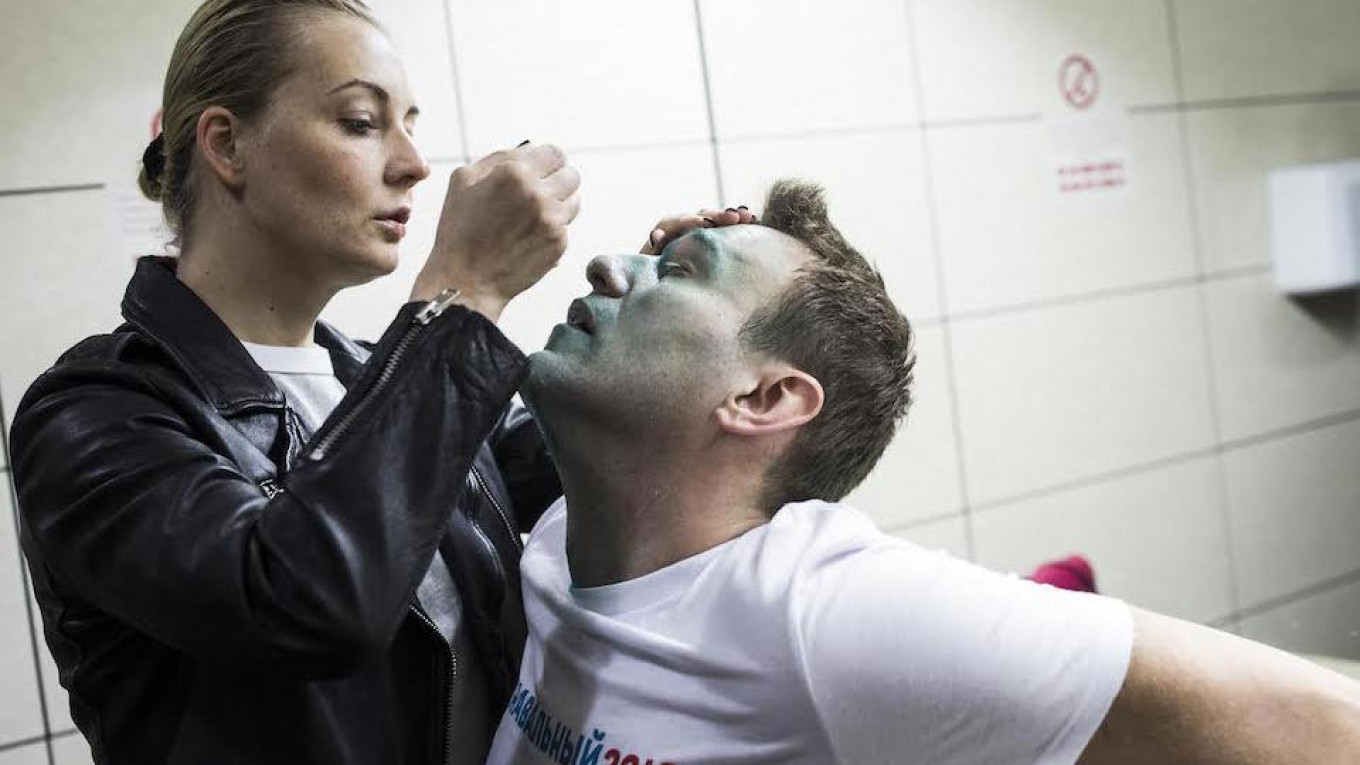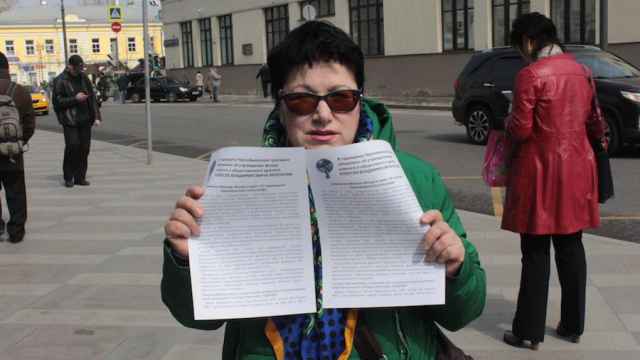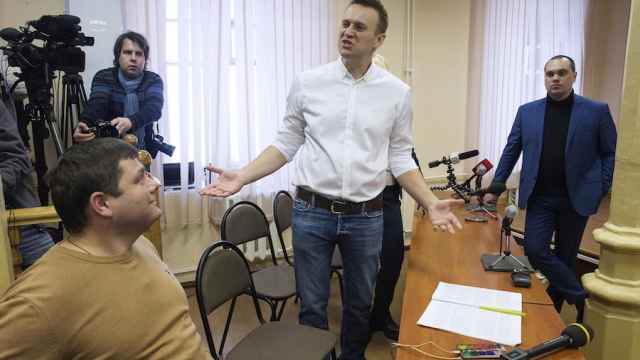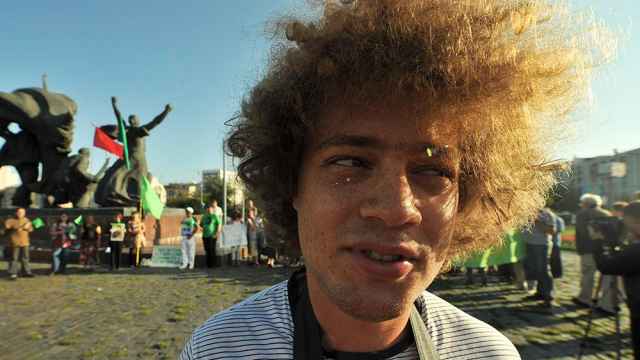Zelyonka, a brilliant green antiseptic, has somehow become the weapon of choice for attacking the Russian opposition.
Until recently, zelyonka was considered a harmless substance, but an assault on Alexei Navalny on 27 April challenged that assumption. For days, doctors have struggled to save his right eye after it was splashed with the green liquid. According to Navalny, doctors believe this time zelyonka was mixed with “something toxic,” and that this burnt his eye.
Writing on his blog, and with trademark irony, Navalny joked that if doctors are unable to save his eyesight, “Russia will have a president with a stylish white eye.”
“Welcome to Russia 2017,” he continued. “Instead of an election debate you constantly get all kinds of crap thrown into your face.”
But the attack on Navalny was not an isolated incident. In the same week, other Russian political activists were attacked with chemicals — mostly zelyonka – in Moscow as well as in other cities. As Russia enters election season, it would seem pro-government vigilantes are becoming militant.
They do so in an environment of impunity.
Police inaction
In the absence of a proper investigation, it fell to Navalny’s supporters to identify the attackers. A video of the attack was available, aired by the government controlled Ren-TV television channel. Incredibly, the TV station decided to run the video in edited form, blurring the faces of the attacker and an assumed associate.
As calls went out for full transparency, a resourceful activist discovered an unedited version of the video, buried deep on Ren-TV’s website. This video, which showed one of the faces uncensored, immediately identified the assumed associate as Alexander Kulakov, an activist of the radical nationalist pro-Kremlin SERB group.
In interview to Novaya Gazeta, Kulakov admitted that it was him, but denied that he was involved in the attack itself. However, Navalny’s supporters discovered that he threatened Navalny with zelyonka a few days before on social networks.
The second man, whose face remained censored was identified on the basis of clothes and build, to be Alexander Petrunko, another SERB activist. Ren-TV certainly knows the man’s identity, but refused to confirm it to the Meduza news organization. They also refused to disclose how they came to possess the video.
The response of Russia’s law enforcement has been to ignore the attacks.
“Police reacted as if they understand that the attacks were a special government operation targeting Navalny and other activists,” – Pavel Chikov, head of the human rights watchdog Agora, told The Moscow Times.
The Kremlin connection
It is little secret that Russian authorities have historically cultivated links with radical groups to harass so-called “disloyal elements.”
The man usually regarded as the architect of such collaborations is Vladislav Surkov, formerly Putin’s manager of domestic politics. Now, Surkov holds the less influential position of presidential aide on Ukraine and the former Soviet republics.
Surkov designed Nashi, a notorious pro-Kremlin youth group that came to prominence after the Orange revolution in Ukraine. Over many years, Nashi harassed opposition activists, Western diplomats, independent reporters and human right watchers on a massive scale and on a daily basis. They were never shy to claim direct ties with Russia’s political leadership.
Operating with friends in high places, the radical groups flirted with criminality. According to the 2014 court testimony of nationalist activist Yevgenia Khassis, Surkov established working links with another extremist group, BORN, via a nationalist intermediary, Leonid Simunin. This group was later tried and found guilty of the murder of lawyer Stanislav Markelov and reporter Anastasia Baburova in 2009. (Simunin later re-emerged as an official in the self-proclaimed separatist Donetsk republic in eastern Ukraine.)
Arm-length activists
The system of arm-length relations between authorities and radical activists, such as those constructed by Surkov, is now history, political expert Nikolay Petrov told The Moscow Times.
The activists identified in the Navalny attack appear, instead, to have emerged from the ashes of post-Maidan Ukraine. SERB itself was founded across eastern Ukrainian cities in March 2014 and pushed a pro-Russian agenda, often violently, and most prominently during bloody clashes in Kharkiv.
In Russia, SERB have repeatedly harassed opposition activists and venues, including the makeshift Boris Nemtsov memorial on the bridge where he was murdered.
According to Sergei Smirnov, editor of the Mediazona website, SERB activists are “slighted” people, with personal reasons to attack the opposition. “They are sincere, which is rare,” he adds.
There are signs that Russia’s leadership is not always pleased with the activities of its loyal vigilantes. Earlier last year, Petrunko, the man who allegedly threw a chemical in Navalny’s eye, was detained at an exhibition by U.S. photographer Jock Sturges in central Moscow. The nationalist activist had thrown urine over the pictures, which, he said depicted images of child abuse.
Later, Petrunko was sentenced to 7 days arrest by a Moscow court. It was a highly unusual imposition of law and order against loyal elements.
It could only have happened for one reason, a source close to the Kremlin suggested — Vladimir Putin was displeased by the incident and decided to get personally involved.
Loosening grip
Pro-government vigilantes remain the regime’s natural allies, and police inaction is thus likely to continue, says Smirnov: “The Kremlin has been happy with volunteer activism.”
That said, the Kremlin is also attempting to portray a softer agenda, a limited liberalization, deliberately releasing several activists from prison. It remains to be seen how the two visions can be squared.
The authorities also find themselves limited by unexpected political developments. The tensions created by Navalny’s anti-corruption protests in March, for example, mean that the Kremlin no longer has the luxury of shaping a consistent policy. Developments are now increasingly beyond their direct control.
Violent harassment of the opposition by vigilante proxies is one area where their grip is loosening. “Whether they like it or not, it is expanding all by itself,” says Petrov.
Few doubt the Kremlin’s role in setting free the forces that have led to this point. What is less clear is whether they can now control them.
A Message from The Moscow Times:
Dear readers,
We are facing unprecedented challenges. Russia's Prosecutor General's Office has designated The Moscow Times as an "undesirable" organization, criminalizing our work and putting our staff at risk of prosecution. This follows our earlier unjust labeling as a "foreign agent."
These actions are direct attempts to silence independent journalism in Russia. The authorities claim our work "discredits the decisions of the Russian leadership." We see things differently: we strive to provide accurate, unbiased reporting on Russia.
We, the journalists of The Moscow Times, refuse to be silenced. But to continue our work, we need your help.
Your support, no matter how small, makes a world of difference. If you can, please support us monthly starting from just $2. It's quick to set up, and every contribution makes a significant impact.
By supporting The Moscow Times, you're defending open, independent journalism in the face of repression. Thank you for standing with us.
Remind me later.







